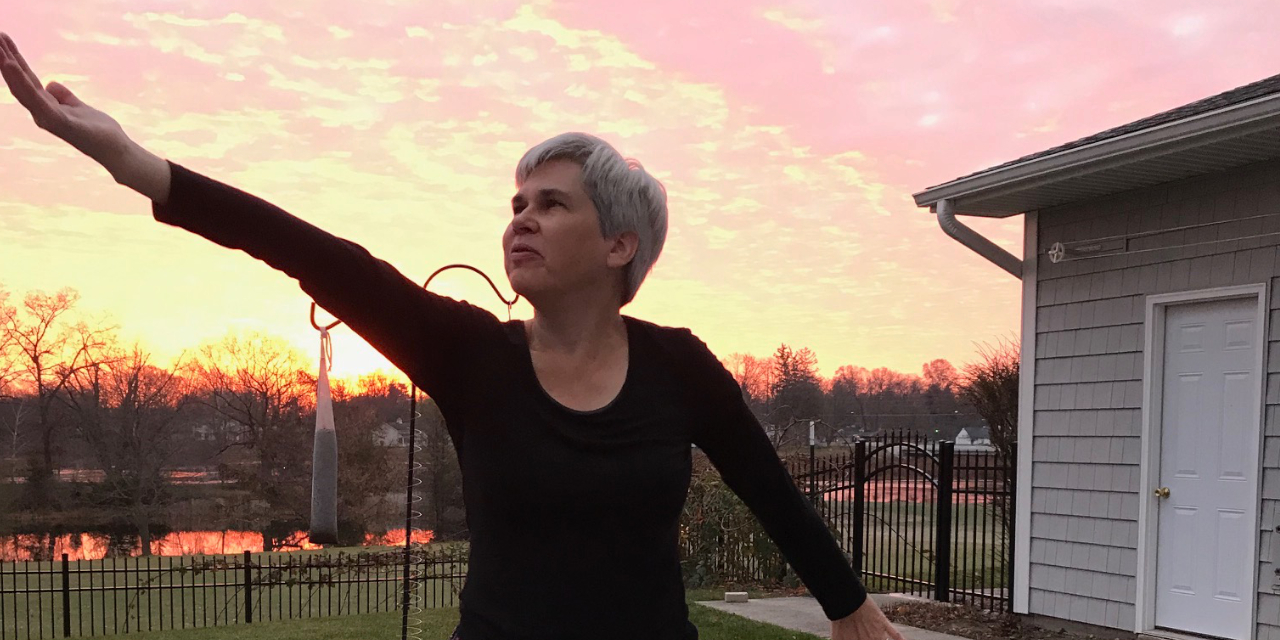Rebecca Stoltzfus, the president of Goshen College, begins her mornings at around 5:45 with tai chi, an ancient Chinese discipline involving gentle stretches and movements. In an effort to connect the mind and body, tai chi flows from each motion to the next, maintaining constant movement in a meditative state.
If the weather is nice, she will take her practice outside to her favorite spot on the back deck, which includes a view of the Goshen Dam Pond as well as a silhouette of Stoltzfus’ treasured hackberry tree, which she calls “Lady Hackberry.”“It’s just really lovely to be awake, alone and under the sky,” said Stoltzfus, “and then moving into this really gentle way to kind of wake my body up and get my blood circulating.”
For Stoltzfus, tai chi has become a way to escape from a college president’s demands and to “experience life through breath and body and motion and nature.”
“There is so much about life that feels too full and not gentle,” Stoltzfus said.
Tai chi is a way to quiet the mind before the demands of the day. These demands include an average of 20 to 30 meetings per week and 100 email messages on a typical day.
Given that intensity, she said, it’s been beneficial for her to “get out of her mind” and into a meditative state.
The tai chi movements Stoltzfus learned are separated into three sections. The first section focuses on the six directions of movements: front and back, the two sides and up and down.
This part focuses on “expelling all the stuck energy … and inviting in fresh air from each of the six directions,” Stoltzfus said.
The second section is called the eight pieces of brocade, which “stretches or uses every bit from fingers to toes.”
The last part of her routine is called “centering the heart,” which is focused on “keeping all the good energy that you’ve created with tai chi and just centering it in your core,” she said.
Stoltzfus first tried tai chi in 2013 when she and her husband, Kevin Miller, a major gift officer at the college, were celebrating their 30th wedding anniversary. They spent the week in a cabin in Ontario along the Niagara River, north of Niagara Falls. Miller brought along a tai chi CD; they have been hooked ever since.
Tai chi was a turning point. At the time, Stoltzfus was transitioning from her job as a professor at Cornell University to juggling both half-time teaching and administrative work.
“Life was just complicated,” she said.
Additionally, her children, Lydia and Gabe, were old enough to be independent, allowing her to have her mornings to herself.
“There wasn’t this sense of getting up and first being a mom and then going to work,” Stoltzfus said.
“It opened up the possibility of crafting a really beautiful way to start the day,” she said. “The alternative is, you know, you sort of wake up and let whatever urgent thing is happening in life take over your mind.”
After 10 years of tai chi, within 38 years of marriage, Stoltzfus and Miller have each found their own styles and movements, which Stoltzfus captured in this exchange: “Wait, you do it that way? I do it this way.”
Although tai chi is an important piece to Stoltzfus’ routine, it is part of an array of activities that allow her to quiet her mind before a busy day. She also fits a coffee break and journaling into the mix to check in and assess her thoughts.
“My morning routine is a big deal for me, and it’s something that I really have worked on and settled into over the past decade,” she said. “It was years of wanting to start a morning routine but not having the discipline.”
Stoltzfus is not the only one at Goshen College with a passion for tai chi. Billy Easton, an assistant grounds worker, has been practicing tai chi for many years along with wing chun and qigong, which are two other forms of Chinese martial arts.
“It really grounded me in my body in a way I hadn’t experienced before,” Easton said. “The results were just kind of mind-blowing.”
As Easton started to learn the movements of tai chi, his practice improved.
He noticed he had more control of his body and breathing: “There is a certain harmony that kind of develops … and you can take that throughout your day.”
Easton noticed changes not only in his practice but also in his daily life.
“As you develop a certain confidence and respect for your body movements, you notice that you perform more efficiently in your normal activities,” Easton said. “You don’t just get better at the movements; you get better at functioning in your life.”
Although many forms of martial arts involve combat, tai chi takes a much different approach, focusing on the subtle energy inside the body. For both Easton and Stoltzfus, their tai chi practice is personal to them.
“No one could take this from me,” Easton said.
In the same way, Stoltzfus said, “I love competition … but this is not competitive … it’s really about being in your body.”




